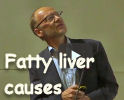
 Or should we look at the causes of fatty liver? The article below, which is based on a press release for a fertility treatment conference, (Asia Pacific Initiative on Reproduction (Aspire 22)), asserts that it is discriminatory to withhold fertility treatments from obese women. It argues that having children is a right which outweighs the downsides of the obese having children. It talks vaguely about restricting calories and adding exercise as treatments for obesity. This seems cruel when there is so much evidence that restricting starches and sugars is more doable and effective for reversing obesity and its consequences. It is a pity that the article does not look at why we have an obesity epidemic, and the role of simple carbohydrates (sugar and starch) in producing addiction and fatty liver, which in turn affect appetite and weight, causing vulnerability to so many endocrine diseases, notably diabetes and its hallmark sequelae. The silence on the role of simple carbs on fatty liver, fatty liver as a precurser to diabetes, and the shocking rise in the incidence of fatty liver, is telling. There is so much money to be made out of selling sugar and starch and so much money to be made out of selling fertility treatments, and so much money to be made out of questionable and dangerous obesity treatments, and so little money to be made out of educating people about sugar and starch or, indeed, asking them to reflect on the consequences of maintaining the world's population at current levels. We publish the article below for a glimpse at the mentality involved, but we also embed an excellent GP conference talk, "Non-alcoholic fatty liver disease. Is diet the culprit? by Dr David Unwin, PHC Conference 2018," on the role of starches in fatty liver and the roles of fatty liver in diabetes, in the hope that obese women looking for fertility treatments might find some hope for reversing their obesity instead. Dr Unwin's practice has reversed a considerable number of apparently hopeless cases of Type 2 diabetes and obesity, incidental to reversing fatty liver.
Or should we look at the causes of fatty liver? The article below, which is based on a press release for a fertility treatment conference, (Asia Pacific Initiative on Reproduction (Aspire 22)), asserts that it is discriminatory to withhold fertility treatments from obese women. It argues that having children is a right which outweighs the downsides of the obese having children. It talks vaguely about restricting calories and adding exercise as treatments for obesity. This seems cruel when there is so much evidence that restricting starches and sugars is more doable and effective for reversing obesity and its consequences. It is a pity that the article does not look at why we have an obesity epidemic, and the role of simple carbohydrates (sugar and starch) in producing addiction and fatty liver, which in turn affect appetite and weight, causing vulnerability to so many endocrine diseases, notably diabetes and its hallmark sequelae. The silence on the role of simple carbs on fatty liver, fatty liver as a precurser to diabetes, and the shocking rise in the incidence of fatty liver, is telling. There is so much money to be made out of selling sugar and starch and so much money to be made out of selling fertility treatments, and so much money to be made out of questionable and dangerous obesity treatments, and so little money to be made out of educating people about sugar and starch or, indeed, asking them to reflect on the consequences of maintaining the world's population at current levels. We publish the article below for a glimpse at the mentality involved, but we also embed an excellent GP conference talk, "Non-alcoholic fatty liver disease. Is diet the culprit? by Dr David Unwin, PHC Conference 2018," on the role of starches in fatty liver and the roles of fatty liver in diabetes, in the hope that obese women looking for fertility treatments might find some hope for reversing their obesity instead. Dr Unwin's practice has reversed a considerable number of apparently hopeless cases of Type 2 diabetes and obesity, incidental to reversing fatty liver.
Asia Pacific Initiative on Reproduction
SINGAPORE, April 30, 2022: The worldwide increase in the prevalence of female and male obesity is having a profound impact on general health and fertility, particularly among women of reproductive age.
Overweight or obese women are at greater risk of menstrual dysfunction or pregnancy related difficulties, and those with excessive body mass index (BMI) undergoing assisted reproductive technology experience a higher incidence of complications including miscarriage or low birth rates.
As a result, assisted reproduction is being withheld from women above certain BMI thresholds in some countries with proponents of this policy citing risks to women seeking treatment, the well being of potential offspring, and costs to public health systems.
However, a global audience of fertility specialists from more than 100 countries was told today that denying fertility treatment to women based on BMI was discriminatory, and for older women with a reduced reproductive window of opportunity it could deny any chance of achieving motherhood.
Professor Eileen Manalo, a fertility specialist from the Philippines, told the 2022 Congress of the Asia Pacific Initiative on Reproduction (ASPIRE) of the potential consequences of IVF clinics imposing cut-offs on treatment based on excessive weight of patients.
The Congress in virtual format is linking scientists, clinicians, nurses and counsellors to address the obstacles facing couples striving for parenthood and latest advances in infertility treatment, particularly in the Asia Pacific region.
Professor Manalo from the University of the Philippines College of Medicine and Assistant Secretary of the International Federation of Fertility Societies (IFFS), said according to latest estimates more than 50 per cent of women of reproductive age globally were overweight or obese.
Obesity is defined by the World Health Organisation as a BMI equal to or exceeding 30kg per square metre, and the Asian equivalent is equal to or more than 25kg per square metre.
"The causes of obesity include excessive calorie intake and lack of physical activity, and the consequences include increased risks of sleep apnea, musculoskeletal disorders, cardiovascular disease, diabetes and malignancies, including colon, endometrial and breast cancer," Professor Manalo said.
"It is also known to have a profound impact on reproductive health and in women with higher BMI undergoing assisted reproductive technology there is lower oocyte recovery, higher risks of ovarian hyperstimulation syndrome (OHSS), higher miscarriage rates, and a reduction in live birth rates in both fresh and frozen embryo transfers.
"A recent meta-analysis based on 682,532 fresh and frozen IVF cycles concluded that obese women had a significantly decreased chance of giving birth following IVF compared to normal weight women.
"These poorer reproductive outcomes in obese women have been attributed to impaired ovarian function, poorer oocyte quality, and diminished embryonic and uterine development.
"Being overweight also adversely affects the health of children born to parents who are above recommended BMI levels, including cardio-metabolic respiratory and cognitive related outcomes."
Professor Manalo said excessive weight among women trying to achieve pregnancy could be addressed by diet and exercise and, in more serious cases, pharmacotherapy and surgery to limit calorie intake.
IVF units in a number of countries, including Canada, Italy, New Zealand and England have imposed BMI cut-offs to access fertility care. In ASEAN countries there is is no uniform, cut-off provision.
"Patients should be made aware of the risks of high BMI levels and the benefits of weight loss, and be offered resources to help them lose weight."
But Professor Manalo said if a woman was unable to lose weight despite effort, withholding fertility treatment could not be justified.
"Denying fertility care on the basis of weight is discriminatory leading to stigmatisation that can exacerbate feelings of low esteem, social isolation, anxiety and depression.
"For older obese women or those with diminished ovarian reserve denying fertility care until they have lost a specific amount of weight may cost them valuable time and any chance of pregnancy."
For more information on the ASPIRE 2022 Congress, go to www.aspire-2022.com

Add comment